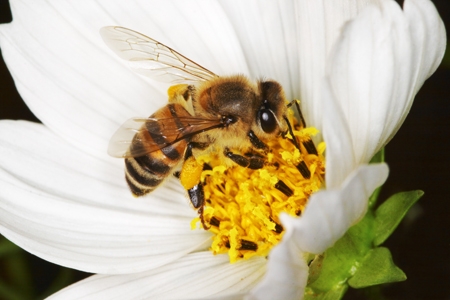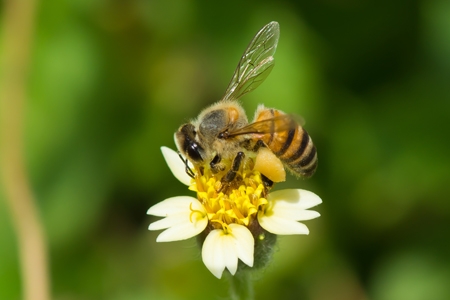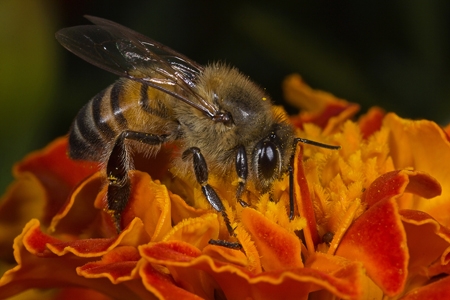Active Seasons




Africanized Honeybee Appearance and Size Facts
Africanized honeybees, often called killer bees, are a hybridized strain of the European Honeybee, predominantly derived from African and Italian subspecies in the United States. Displaying a range of colors from yellow and black, they closely resemble western honeybees, making it challenging to distinguish between them without DNA testing or microscopic laboratory analysis. One of their only defining characteristics is that these bees are approximately half an inch in length, which is 10% smaller than their non-Africanized cousins.
They have an interesting origin story. In 1957, a group of 26 African honeybee queens escaped from an experimental apiary in Brazil. This event led to the hybridization of native honeybees with the African honeybees, resulting in the formation of the Africanized honeybee hybrid.
Subsequently, these hybrid bees have gradually expanded their presence northward into the southern United States at a rate of approximately 100 to 200 miles per year. Numerous sightings have confirmed their existence in various locations across south Florida. Feral hives can be discovered within hollow trees and occasionally in caves or crevices in rock formations. Additionally, there have been instances where a colony opted to establish a nest inside an attic, crawl space, or wall void within residential structures.
Distinguishing Africanized Honeybees From Other Bees
Identifying Africanized honeybees can be challenging due to their close resemblance to other honeybee species. While you may not be able to tell the difference, the professionals from Hulett Environmental Services have the skills to differentiate them accurately. Their aggressive behavior, tendency to swarm, and preference for nesting in unique locations, such as tires, crates, boxes, and even empty cars, are key indicators that set them apart. Keep an eye out for aggressive bees in these locations, and if you find them, reach out to Hulett immediately.
We offer bee removal services for Africanized honeybees in the following locations and their surrounding areas:

Behavior and Habitat of Africanized Honey Bees
Africanized honeybees are notably more aggressive than their European counterparts. They tend to attack in larger groups, produce less honey and wax, and have a higher likelihood of swarming or absconding. While their aggression levels can vary across generations, their distinct behaviors, such as disliking high-pitched sounds, persist. Africanized honeybees can form nests in diverse locations, including hollow trees, caves, rock formations, attics, crawl spaces, and wall voids within homes.

Signs of Infestation of Africanized Honey Bees
Due to their small colony size, Africanized honeybees may build nests in unconventional places like tires, crates, boxes, or empty cars. Unfortunately, their hiding skills often lead to painful stings when unaware people disturb their nests. Like other bees, their nests are made of wax and other materials and are easy to identify due to the large swarms of drones surrounding them.
We don’t recommend you attempt to check whether the bees are Africanized, as this could put you at risk of injury. So if you discover any bees on your property, just call Hulett.

Tips for Prevention of Africanized Honey Bees
Africanized honeybee infestations require professional assistance, and it’s important to reach out to experts like Hulett Environmental Services. Regular inspections are the best way to prevent an infestation as they allow our exterminators to eliminate individual bees before a colony forms.
In the event of an encounter, individuals are advised to run in a zigzag pattern and seek shelter in a house or car, avoiding water where the bees might wait. If stung, the stinger should be removed promptly using a flat, hard object like a driver’s license or credit card. You should also seek medical attention after stinger removal for further advice.
Africanized honeybees are dangerous. For your care and protection, let Hulett take care of your pest problems.
Getting Rid of Africanized Honeybees
Due to their aggressive nature, you should not attempt to remove an Africanized honeybee infestation on your own. To properly remove these bees from your property, specialized equipment, training, and personnel are required. Thankfully, you can always count on Hulett for a speedy inspection and treatment recommendation. Here at Hulett, we’ll create a personalized plan to help prevent pests from infesting your home in the first place.
Effective Africanized Honeybee Control Solutions
Keep your family, friends, and pets protected from the potential dangers of Africanized honeybees. Contact Hulett Environmental Services today for professional inspection and control solutions.



